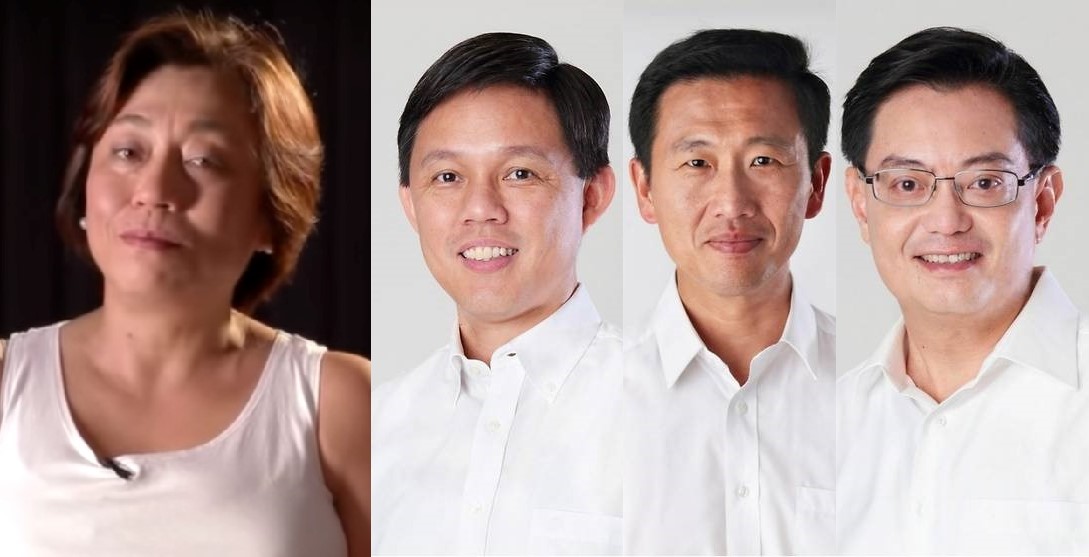Former Straits Times editor Bertha Henson has noted that the ruling party’s fourth generation (4G) leaders “have a pretty short fuse despite the promise to listen to opinions,” in a recent blog post.
In her coverage of the People’s Action Party (PAP) Central Executive Committee (CEC) election results, Henson added that it appears as though the 4G leaders have an “image problem” and that the transitioning Government “is acting out the same old drama”.
Providing a comprehensive recap of the CEC election results, Henson noted that the real action will begin when the roles that the 12 elected members will take on is revealed in the coming weeks.
On the ongoing leadership transition, Henson said that the person who is selected to succeed PM Lee out of the cohort have his work cut out for them since he will have to show why he deserves the top spot. Likening the change in guard to a switch in a cast of actors, Henson wrote:
“The change in the cast of actors is intriguing to watch. But I can’t help but think about the pressure the star performer will face when the curtain finally parts. It isn’t just the 4G leaders who have been trying to reach a consensus, there’s plenty of talk on who will be leader among the polity itself. It isn’t enough for the lead actor to have the backing of his peers, he needs to demonstrate to the audience why he deserves top billing as well.”
Henson then pointed out that the people have no idea what the capabilities of the 4G leaders are, since they “have always emphasized its collective position, rather than point to individual characters who are making their mark.” She asked:
“Given its collective persona, is there then a distinctive style that separates them from the earlier leadership?”
Pointing out that the year starting on a high note with the younger leaders taking on more responsibilities, Henson noted that the 4G leaders did not fully carry out their pledge to forge more interactions with the people, outside of their media interviews or closed-door dialogues.
Highlighting that the year was marked by events that reinforced the Government’s old top-down style of politics, Henson noted:
“The 4G leaders have given some very vigorous responses even to moderate comments in the media, demonstrating that they have a pretty short fuse despite the promise to listen to opinions with respect and humility.”
“What we remember instead is a year in which Mr Heng and Ms Grace Fu, also elected into the CEC, tussled with the Workers’ Party on the proposed rise in GST, and the town council law suits against some WP leaders which, to many, smack of the old-style PAP confrontational politics even though the suits were initiated by an independent panel.
“We recall the grilling that the Parliamentary Select Committee gave to some representors, especially historian P J Thum, at the hearings on deliberate online falsehoods. We see the tightening of OB markers, with new laws to secure public order and lower thresholds for contempt of court indictments. The 4G leaders have given some very vigorous responses even to moderate comments in the media, demonstrating that they have a pretty short fuse despite the promise to listen to opinions with respect and humility.”
After highlighting ground frustrations over the depreciating value of public housing, jobs and the ever-rising cost of living, Henson offered that perhaps this 4G leadership will try to leave its mark in other areas of governance rather than in bread-and-butter issues:
“Perhaps, the 4G is intending to make its mark in education, breaking the Singaporean mindset away from the emphasis on grades and the reliance on connections that give those from privileged families a headstart. Several announcements have been made to this effect, whether about polytechnic students’ admission to universities, pre-primary programmes and how international rankings might not give a complete picture of Singapore’s higher education landscape.
“Perhaps, these tweaks will have an impact on another big set of issues they have to deal with: the merits and demerits of meritocracy, its impact on social mobility, and whether elitism has seeped in too deep into society to be uprooted. These are philosophical and cultural issues that would have to be factored into policymaking.
“In this respect, they suffer from an image problem. They are viewed as products of a system which has nurtured them, buffeted by the ever-controversial ministerial salary issue, in a closed elite of technocrats bound by old school/public service connections. Even the CEC doesn’t have a single backbencher in its ranks.”
Henson further pointed out that the 4G leaders don’t “give much room for alternative viewpoints,” and instead pin the blame on the people:
“Their vigorous defence of the social support system in place – Workfare Income Supplement, Silver Support Scheme, Progressive Wage Model – doesn’t give much room for alternative viewpoints. Instead, increasingly, the blame seems pinned on the people at large, for not being able to see beyond their noses and sniffing at the less well-off.”
The veteran journalist concluded that she doesn’t see any sort of “political or governing style emerging from the 4G leaders.”
Noting that “the cast is acting out the same old drama,” and that they need a fresh script, Henson said that she is concerned that the 4G leaders will end up glorifying the continuity of the PAP’s policies while lecturing the people on how vulnerable Singapore is:
“In other words, I don’t see any kind of political or governing style emerging from the 4G leaders. What’s worse is I think they will make a virtue of continuity of policies and style, even while they deliver lectures on Singapore’s vulnerabilities in an increasing complex world.
“The cast is acting out the same old drama. Hopefully, the unveiling of the star will be accompanied by a change of script.”

